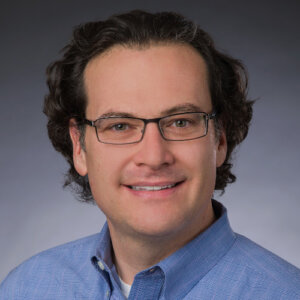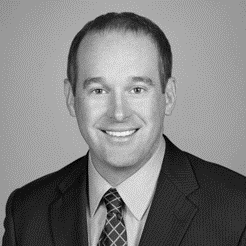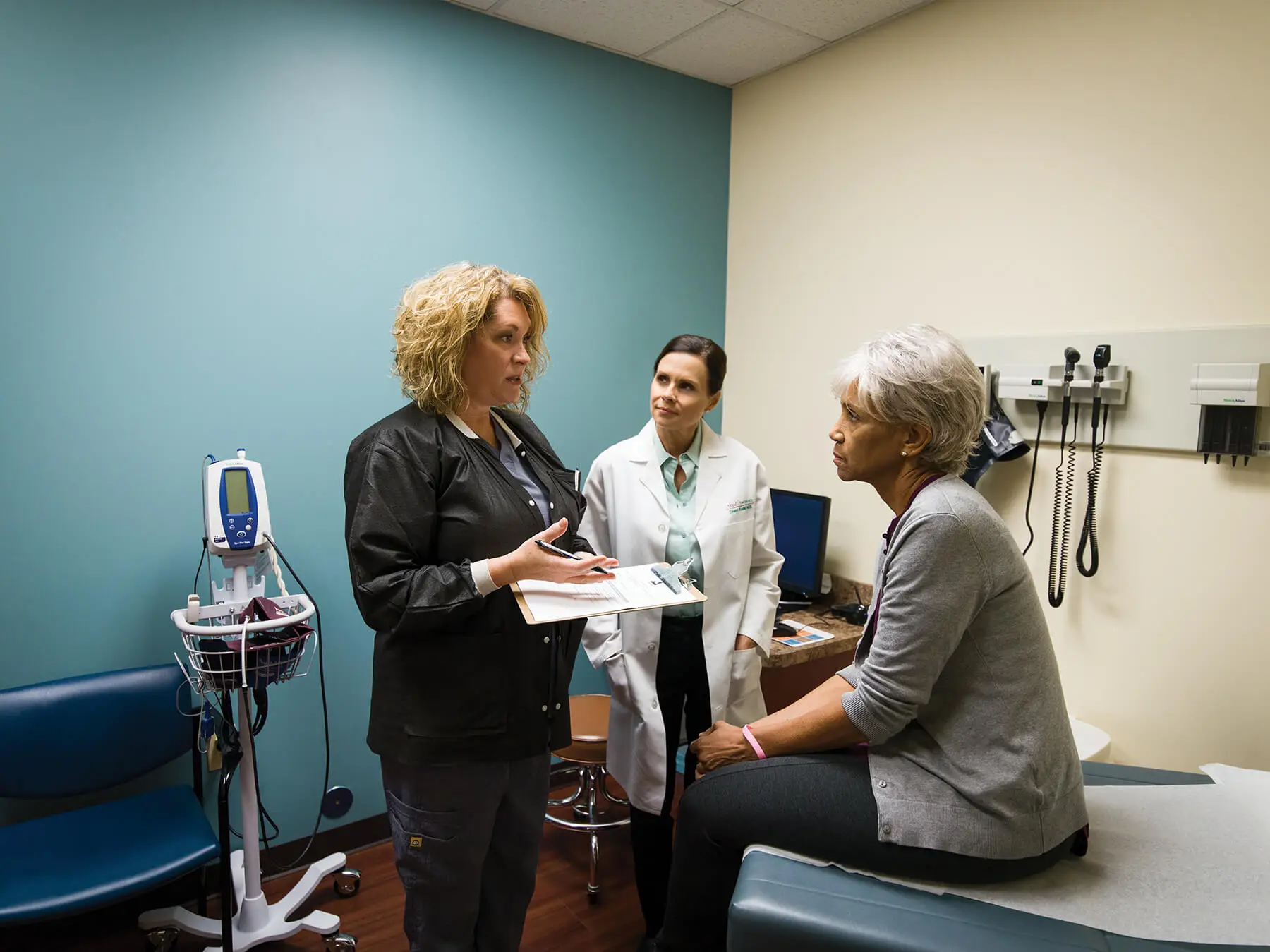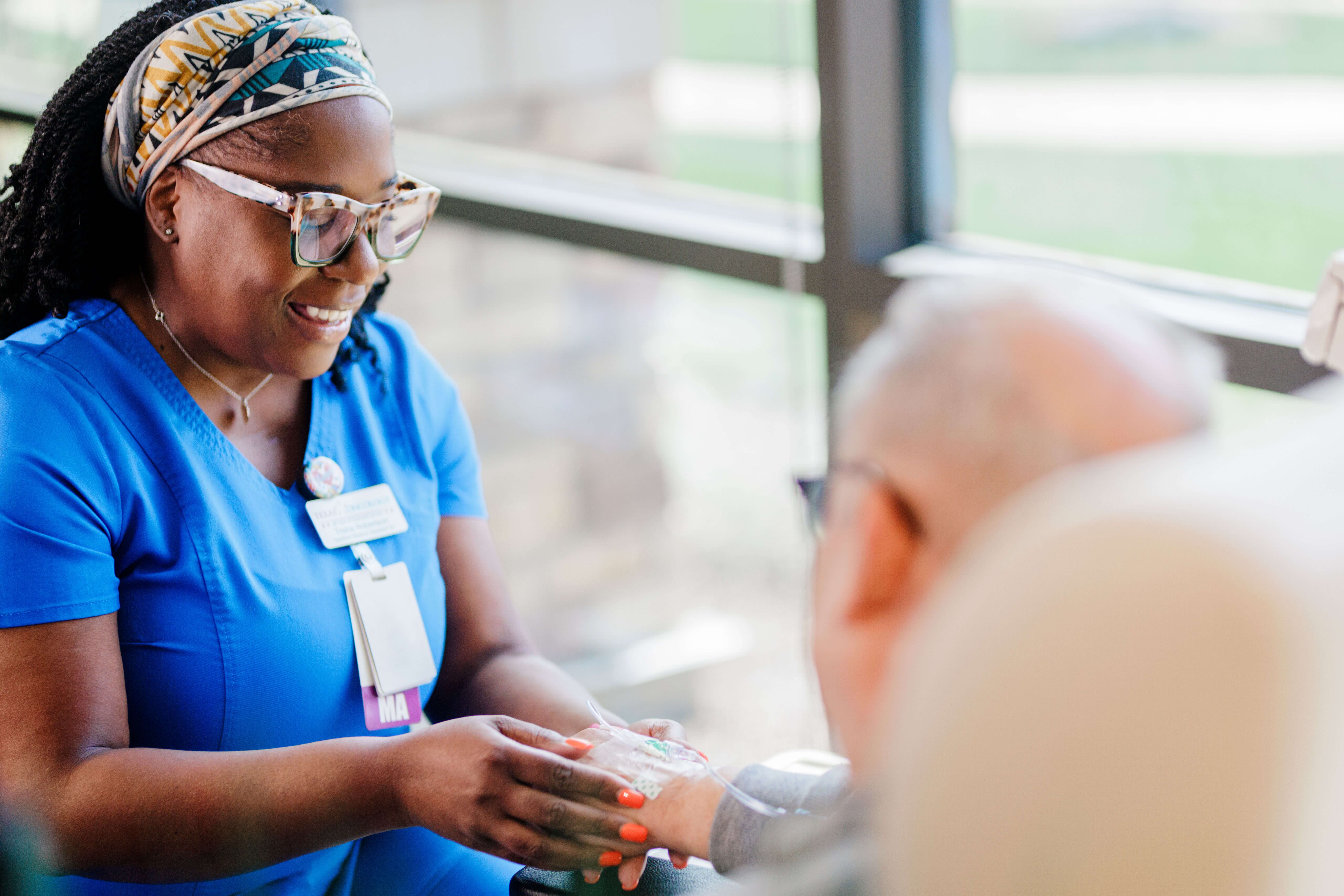
Lalan Wilfong, MD
Senior Vice President, Payer and Care Transformation

Stuart Staggs
Senior Director, Strategic Programs
by Jason Hammonds, president
2022 was a year of tremendous growth for The US Oncology Network – and we’ve kicked off 2023 by announcing that two new practices have joined our organization. As we’re growing, we’re not only welcoming new physicians, providers, and practices, but we’re also expanding capabilities, insights and collaboration in support of our unwavering mission to advance community oncology care and keep independent community oncologists flourishing.
Now more than 2,000 providers strong, The Network continues to provide unparalleled clinical tools, financial security, comprehensive operational support and value-based care expertise, all while allowing physicians to remain independent and provide outstanding care for patients close to home.
I’m incredibly proud of what The Network is accomplishing together. This not only includes growing the business to ensure more patients receive care close to home, but also leading the way in key initiatives such as value-based care, precision medicine and clinical research. Let’s take a look back at our past year.
Strength in numbers
Over 280 providers joined The Network in 2022, making us even better equipped to provide care to more patients. And as we grow, we deepen our collective expertise, expand our network of collaboration, and build upon the breadth of resources that we can provide to practices and the patients they serve.
We also had several practices, including Missouri Cancer Associates, Shenandoah Oncology and Maryland Oncology Hematology, renew their management agreements with The Network.
“Being a part of The US Oncology Network has helped our practice remain strong and deliver comprehensive care to our patients,” shared Dr. George Sotos, president, Maryland Oncology Hematology. “We have benefited from The Network’s extensive operational and clinical solutions, including strategic planning support, revenue cycle optimization and efficient drug management. We have access to both a wide range of promising novel therapies through the research program, and to the collective knowledge of 2,000 providers in The Network. These capabilities mean that together, we can provide expert, state of the art cancer care to our patients, in their communities, now and in the future.”
You can read about the ways we have helped our practices succeed here.
Shaping the future of cancer care
Physicians in The Network continue to stand out as thought leaders in the industry and were included in over 250 leading publications such as the Journal of Clinical Oncology, American Society of Clinical Oncology, American Journal of Managed Care, and The Hill, just to name a few.
Many physician across The Network have also taken on leadership roles within the industry, including: Dr. Debra Patt, who was recently elected to serve as the Vice President of the Community Oncology Alliance (COA) and elected to join the American Society of Clinical Oncology (ASCO) Board of Directors; Dr. Moshe Chasky, who was elected to serve on the COA Board of Directors, and Dr. Barry Brooks, who sits on the National Community Oncology Dispensing Association (NCODA) Executive Council. As part of The Network’s power, we give independent physicians a platform to share their insights and expertise to help further advance initiatives for patients and providers.
You’ll find highlights from our news coverage here. Thank you to these experts for sharing their perspectives and shaping the future of cancer care.
New initiatives to enhance the power of The Network
As quickly as healthcare is evolving, we are also continually undertaking new initiatives to ensure The Network is at the forefront of care. This year, we:
Kicking off 2023 by welcoming two new practices
We’re looking forward to another year of growth in 2023 and have begun the year by announcing that two new practices, Epic Care and Nexus Health, have joined The Network. With the addition of these multidisciplinary practices, we are entering new communities in Santa Fe, New Mexico and California’s East Bay, respectively, and expanding our ability to empower high-quality care in the community.
I can’t wait to see what this year brings as we continue to enhance the power of The Network and support our partner practices in achieving their strategic objectives.
ABOUT THE AUTHOR
 |
Jason Hammonds has served as the President of The US Oncology Network since 2021. He has supported The Network for more than 15 years in a range of leadership roles.
|
As the largest participant in the Oncology Care Model (OCM), representing over 25% of total physician participation and nearly $250 million in combined savings to Medicare, The US Oncology Network welcomes the release of the Enhancing Oncology Model (EOM).
“While we are continuing to review the details of the EOM, we are pleased The Centers for Medicare & Medicaid Services Innovation Center (also known as “CMMI”) is pursuing a voluntary, physician-driven, oncology-specific model that emphasizes health equity,” said Dr. Marcus Neubauer, chief medical officer, The US Oncology Network. “The development and implementation of the OCM was a very collaborative process between CMMI and the stakeholder community, and we look forward to continuing that collaboration to ensure successful participation in this new model.”
The EOM contains new challenges—in comparison to the OCM, the EOM entails more down-side risk, covers a smaller population, and has a lower monthly enhanced oncology services (MEOS) payment, but it also represents a strong step forward on the path toward value-based care.
Every May, we celebrate Oncology Nursing Month to recognize the critical role oncology nurses play in patient care. Despite the challenges of recent years, nurses have continued to show up for patients with fierce dedication and compassion.
This year’s theme, “The hands and hearts of hope,” reminds us that nurses are often a source of strength and hope for their patients and loved ones. And oncology nurses give hope to their patients and families while they travel through their cancer journey with a gentle touch before a procedure, a kind word in passing, or by comforting a patient or family member at the end of a journey. Oncology nurses tirelessly lead with expertise and compassion while providing hope and comfort for those facing the unimaginable.
Nurses have been a sense hope since the dawn of the profession, but in the last two years, they have had to juggle more than ever while caring for patients with cancer and the challenges of the pandemic. Through it all, they continue to make personal sacrifices and preserve for their patients.
We honor all oncology nurses for their dedication, commitment, and passion for helping those in need. Nurses play a key role in their patients’ cancer journey from explaining a diagnosis, to providing guidance through treatment, celebrating victories, and comforting patients through inconceivable setbacks. Even when faced with the most difficult situations, oncology nurses remain fearlessly committed to provide endless compassion and comfort to patients.
The Network recognizes the important role nurses play in providing the highest quality patient care in a community setting and we are committed to supporting the professional growth and development of all our nurses and clinical staff. Nurses in The Network have access to clinical education programs, various certification courses, wellness resources and on-going opportunities for leadership development.
We thank you and celebrate all nurses of The US Oncology Network and beyond during Oncology Nursing Month, and every other day of the year. Thank you for all you do day in and day out!
|
|
Judi Payne-De Bock, BSN is the senior director of Clinical Services for The US Oncology Network. She is responsible for leading The Network’s clinical services team and ensuring nurses and clinical staff at practices in The Network have the resources and support needed to provide high-quality patient care every day.. |
Value-based care can drive meaningful improvements in patient care by aligning payment with value. While many payers have value-based care programs, differences in structures and requirements can leave practices with an unbalanced focus on program requirements. Creating a quality and value-based care strategy allows practices to harmonize various programs ensuring high-quality patient care while minimizing practice burden.
Creating a Quality Strategy
Successful performance in value-based care programs can be defined as improved quality of patient care and outcomes, a reduction in the cost of care for patients, payers, and employers, and the realization of financial benefits tied to performance. Creating an overall quality strategy keeps the practice focused on the key initiatives that can drive performance across programs.
Physician Engagement and Communicating the Quality Strategy
Once the quality strategy is created, a communication plan should be developed. Engage physicians and practice leaders first, then share the value-based care program overview and high-level details with the quality committee and other relevant practice committees. Share the value-based care program in detail with all providers and staff at each clinic. Team members responsible for change processes or creating new workflows should be engaged and help in communicating the new value-based care program including process, metric collection and monitoring, and ongoing performance. Updates should be shared consistently with the quality committee and sites on a consistent basis.
In addition to having a quality strategy in place, physician engagement is key to value-based care program success. When adding to or altering a physician routine, keep improved patient care and physician engagement at the forefront. As physicians are challenged with shifting priorities, value-based care leads should keep them engaged rather than overwhelmed.
Practices that form an overall quality strategy and juggle the complexities of multiple programs will improve patient care and realize financial gains.
Learn more about managing value-based care programs here.
|
|
Toni Gress is the Commercial Value Based Care Lead for The US Oncology Network. She collaborates with Managed Care and the Transformation Leads to lead The Network practices in successful participation and performance in value-based commercial programs with the goal of improving quality and total cost for patients, providers, practices and payers. |
|
|
Jay Scott is the Senior Director of Managed Care for Minnesota Oncology, a practice in The US Oncology Network. He is responsible for the development of patient experience strategy and quality improvement plans aimed at continuous improvement for patients, providers, payers and practices. |
Protecting oncology practices and patient information is more complex than ever in today’s increasingly hostile online environment. More than 93% of healthcare organizations have experienced a data breach over the past three years.1 It is crucial to ensure all physicians and staff have the knowledge and understanding of cybersecurity threats, how they work, and what actions to take to keep practices and their patients safe.
Cybersecurity awareness is knowledge combined with attitudes and behaviors that serve to protect information assets. 95% of cybersecurity breaches are caused by human error. Being “cybersecurity aware” means you understand what potential threats can be and how to prevent them. Here are few ways to incorporate cybersecurity into your everyday routine:
What can you do to help create a culture that’s cyber aware?
The Network supports cybersecurity through state of the art IT solutions, advisory services, incident response support and practice education. Our cybersecurity services aim to protect the safety and privacy of patients and minimize the risk of IT disruptions that can impact clinical outcomes so providers can focus on what matters most –delivering high-quality care to patients.
ABOUT THE AUTHOR
 |
Matt Johnson is the Senior Manager of Information Security Risk Management (ISRM) for The US Oncology Network. He is responsible for cybersecurity initiatives, data center migrations/refreshes and enterprise infrastructure. |
1 https://www.safetydetectives.com/blog/healthcare-cybersecurity-statistics/
November is Lung Cancer Awareness Month and bringing heightened attention, understanding, and support to a disease that kills more people than any other cancer couldn’t be more important. Every 2.2 minutes someone is diagnosed with lung cancer and one in 16 Americans will be diagnosed with lung cancer in their lifetime. 1
Although smoking is a major risk factor for lung cancer, it is not the only cause. According to the CDC, roughly ten to 20% of lung cancers, or 20,000 to 40,000 lung cancer cases each year in the United States occur in people who never smoked or smoked fewer than 100 cigarettes in their lifetime.
“A common misconception about lung cancer is that it’s a smoking related disease,” said Alexander Spira, MD, PhD, FACP, a medical oncologist and director of the Virginia Cancer Specialists Research Institute. “At this point, I have more non-smoker patients than patients who have smoked. Anyone with lungs can get lung cancer.”
More than half of people diagnosed with lung cancer die within one year of diagnosis and the lung cancer five-year survival rate (18.6%) is lower than many other leading cancer sites, such as colorectal (64.5%), breast (89.6%) and prostate (98.2%) 2 . However, lung cancer does not have to be a death sentence as new treatments are being developed and, if caught early enough, lung cancer may be curable.
“Lung cancer tends to be a more aggressive disease and more patients are diagnosed after it has progressed,” said Dr. Spira. “Lung cancer screening is very important to catch the disease early and there are guidelines for when patients with a significant history of smoking, or exposure, should get screened.”
According the American Lung Cancer Association only 5.7% of those at high risk are screened, however if everyone currently eligible were screened, close to 48,000 lives could be saved 3. The five-year survival rate for people diagnosed with late-stage lung cancer is approximately five percent. Lung cancer screening, with a low dose CT scan, is designed to detect cancers at an early, potentially curable stage when patients have no signs or symptoms of lung cancer.
Once a patient does receive a lung cancer diagnosis, biomarker testing can be performed to help doctors identify the potential for treatment with targeted therapies. It is recommended that all patients with newly diagnosed lung cancer undergo complete biomarker testing with a full next-generation sequencing panel. The testing results could inform which FDA-approved therapies or clinical trials in which the patient is eligible.
Unfortunately, not all patients have equal access to these promising therapies, as obstacles prevent certain patients from obtaining testing necessary to utilize some of these treatments. For new advances to reach their full potential, existing inequalities must be recognized and eliminated so all patients who seek care have equal opportunity to receive the best and most targeted therapies.
The MYLUNG Consortium™ is searching for a deeper understanding of molecular testing barriers to improve care for lung cancer patients, including those with mutations who may benefit from receiving precision medicine, the practice of leveraging targeted therapies across the continuum of care, and expand the opportunity for patients to participate in clinical trials. This unique, collaborative real-world research consortium will study up to 12,000 NSCLC patients in the community setting over a five year period.
“In order to fulfill the promise of precision medicine for NSCLC patients, we need a broader understanding of the barriers, challenges, risks and opportunities around molecularly guided therapies,” noted Robert L. Coleman, MD, FACOG, FACS, chief scientific officer, US Oncology Research. MYLUNG will draw insights from these datasets that can lead to better therapy for patients in a timelier manner. Learn more about the MYLUNG Consortium™ research study and the first phase results.
Dr. Mark T. Fleming, a physician with Virginia Oncology Associates (VOA), a member of The US Oncology Network, has been named the new Chair of the National Policy Board (NPB)—the governing board comprised of physician and operational leaders that guides and leads the organization.
Elected by his or her peers, the NPB Chair serves as the voice for The Network physicians and works closely with the President and Chief Medical Officer to ensure alignment across the organization’s strategic initiatives during their three-year term. Starting on October 1, 2021, Dr. Fleming will fill the shoes of Lucy Langer, MD, who served as NBP Chair for the past six years with two consecutive terms.
A Strong Medical Background
Dr. Fleming is a board-certified medical oncologist with VOA. He received his medical degree from Medical University of Ohio prior to completing his residency at Temple University Hospital in Philadelphia, PA, and his Medical Oncology Fellowship at Memorial Sloan-Kettering Cancer Center in New York, NY.
A member of the NPB for the past two years, Dr. Fleming also serves as the medical director of The Network’s Genitourinary (bladder, kidney, prostate and testicular cancers) Research Committee. He is a passionate speaker on the importance of cancer education and the early detection of prostate cancer.
“With the selection of Dr. Fleming as NPB Chair, we are reaffirming our commitment to being a physician-led organization that champions community oncology,” said Jason Hammonds, president of The Network. “Physicians have a voice in every aspect of our organization, from our governing board to the various committees that lead and guide us. I look forward to working closely with Dr. Fleming as we continue our goal of advancing high-quality cancer care and improving outcomes for patients across the country.”
Dynamic, Impactful Leadership
Informing the decision-making process for the organization at every level, the NPB—made up of practice presidents, operational leaders and dozens of committee leaders—is critical to The Network’s success.
“A respected leader in the medical community, Dr. Fleming is a perfect fit for the role of NPB Chair,” said Marcus Neubauer, MD, chief medical officer of The Network. “I look forward to working with Mark on a range of initiatives important to community oncology practices, from operational matters, clinical research, pharmacy and therapeutics, cancer center workflows, staff diversity and inclusion and more. These are exciting times for oncology with promising new treatments coming to the fore, and I know that Dr. Fleming will help lead us into a bright future.”
As the complexities of oncology care continue to evolve, providers need the latest information technology solutions ranging from basic infrastructure to clinical applications and tools to support their practices. The US Oncology Network’s proven technology ecosystem allows providers to focus on what matters most – delivering the best patient care possible, while The Network’s IT team delivers timely, innovative, and effective technology solutions with 24-hour support.
Reliable telephone systems, a secure network infrastructure and a leading EHR are critical for practices to run efficiently. Practices need access to solutions and hands on support from the initial solution implementation to on-going maintenance. The right IT solutions and service support can improve efficiency and reduce costs while aiding providers as they deliver high quality patient care.
Maintaining a healthy cybersecurity posture is also crucial to maintaining practice security in an increasingly hostile online environment. Protecting practice and patient information is more complex than ever and access to dedicated teams of experts committed to providing cybersecurity support and risk protection help aid in the prevention of threats such as phishing attacks, ransomware, and malware.
Enterprise grade portfolio of solutions and leading support
Practices in The Network have access to a diverse portfolio of software solutions and around the clock support. We deliver solutions that make practice operations more efficient and support patient care with transparency every step of the way. Our proactive approach to cyber security ensures practice information stays secure. Through innovation and enhanced service offerings, practices have the modern tools and support they need to deliver quality patient care.
As we look to the future, The Network is committed to bringing the latest technology innovations to our providers at a competitive pace. The right technology environment and support gives practices the freedom and flexibility to focus on patient care, and we are committed to operational, customer, financial and workforce success while driving value for The Network practices.
ABOUT THE AUTHOR
 |
Mudasser Zaheer is the Vice President of Technology Services for The US Oncology Network. He is responsible for technology operations (also referred to as KTLO – Keeping the Lights on) and delivery of our 1,000 technology projects annually across the USON practices while ensuring alignment with the broader strategies of The Network – to enhance operational efficiency and security for practices |
Tremendous progress has been made over the last decade in the battle against cancer, as many exciting new treatments, including novel targeted therapies, have been developed. Unfortunately, not all patients have equal access to these promising therapies, as obstacles prevent certain patients from obtaining testing necessary to utilize some of these treatments. Financial challenges, access to care, healthcare illiteracy and other complex issues prevent many patients from getting tested. For new advances to reach their full potential, existing inequalities must be recognized and eliminated so all patients who seek care have equal opportunity to receive the best and most targeted therapies.
“Achieving the goal of eliminating cancer, or even turning it into more of a chronic condition, is unlikely to occur without identifying and addressing barriers that affect testing,” explained Sarah Alwardt, PhD, VP of Operations for OntadaTM, an oncology data, research and technology business dedicated to improving the lives of cancer patients. “We know inequalities exist that prevent certain patients from receiving testing and optimal treatments, but so far, little effort has been made to identify these obstacles so we can find ways to eliminate them.”
Unique collaboration brings the industry together to investigate testing barriers
A five-year real-world evidence study of 12,000 non-small cell lung cancer (NSCLC) patients is tackling the problem of identifying barriers to testing, in the hopes of developing practical strategies to overcome those obstacles. While the study focuses on NSCLC, the results may be helpful in dealing with other cancers linked to mutations. The MYLUNG ConsortiumTM brings together The US Oncology Network, US Oncology Research and Ontada with several industry stakeholders including providers, life sciences companies and patient advocacy groups.
“The MYLUNG Consortium is a one-of-a-kind initiative, and we are proud to work alongside patient advocates, providers, the research community and other industry collaborators to achieve our common goal of personalizing and improving care for people with lung cancer,” said Jamie Freedman, MD, PhD, head of U.S. Medical Affairs at Genentech. “Through these collective, patient-centered efforts, we are helping identify barriers and evaluate solutions to optimal care – particularly to biomarker testing – to create a future where every patient with non-small cell lung cancer can access medicines that are precisely right for them.”
Testing is one of the most fundamental components of improving care for patients with NSCLC because the disease is defined by a number of specific treatable molecular alterations. While each participating entity plays a distinct role in the care continuum for cancer patients, we are united in recognizing the rate of testing is insufficient to optimize outcomes.
“The MYLUNG Consortium is an opportunity for Lilly Oncology and others working in precision oncology to come together to ensure people with advanced non-small cell lung cancer get timely access to high-quality and broad-based genomic profiling,” noted David Hyman, MD, chief medical officer, oncology at Lilly. “Identifying actionable oncogenic drivers is key to the optimal care for these patients, especially those with rarer mutations found through comprehensive next generation sequencing.”
“The identification of patients who would derive the most benefit from our medicines is a key focus of AstraZeneca’s commitment to precision medicine,” added Camille Hertzka, vice president, Head of Medical Affairs, U.S. Oncology at AstraZeneca. “We are confident that the MYLUNG Consortium will help us realize our ambition to provide the best available treatment for every patient and ultimately transform patient outcomes.”
Participating organizations are putting patients first, above their brands, to focus on understanding testing and treatment patterns, with the goal of identifying practical solutions that improve patient access to precision medicines.
“This collaboration is extremely exciting, as everyone is using resources and strategies they have leveraged in the past to implement prospectively to see what is most effective in increasing testing rates,” said Robert L. Coleman, MD, FACOG, FACS, chief scientific officer, US Oncology Research. “We need a greater understanding of the barriers and opportunities around targeted therapies to fulfill the promise of precision medicine. Insights from the MYLUNG Consortium may eventually lead to better, more timely therapy, not just for lung cancer, but for other cancers that have driver mutations.”
Patient advocacy groups are also playing a key role in the study, according to Alwardt, by keeping the patient at the center of all conversations. This patient-centric focus aligns participants so they are united in trying to figure out what is best for the patients they all serve directly or indirectly.
“One of GO2 Foundation for Lung Cancer’s key goals is ensuring every person diagnosed with lung cancer has access to comprehensive biomarker testing, no matter where they live,” explained Jennifer C. King, PhD, chief scientific officer of the organization. “We are pleased to be part of the MYLUNG Consortium as it will inform us on important best practices that can be implemented in community settings to facilitate precision medicine for everyone.”
Early findings identify gaps
The MYLUNG Consortium consists of three protocols: the first part reviews electronic health records of patients, examining data on testing and identifying historical barriers to testing; the next part will monitor the patient’s treatment through their first line of cancer therapy, focusing on how testing information is obtained and utilized for decision-making; and the final part will launch interventional strategies based on data from the first two phases.
The early results are in for the first part of the study, and the findings show key areas for improvement:
“The low percentage of NGS testing is concerning,” said Dr. Coleman, “as NGS is an extremely valuable and efficient tool for determining the most effective targeted therapy for a patient.” Testing between four and 600 different genes at once, inclusive of all types of genomic alterations that can occur, NGS reveals if something went wrong in one of them. In simple terms, Dr. Coleman explained, “NGS looks into a tumor with a microscope to identify what types of things have been turned on or off, much like a light switch, that make the cell do cancerous things, such as grow unchecked.”
Lung cancer has been increasingly subdivided into smaller and smaller subgroups defined by driver mutations, which are basically light switches being turned on when they should be off. There are mutations in many cancers, but they may not be drivers solely responsible for turning on the light bulb. Consequently, when the driver mutationꟷthe actual light switch that turns off the lightꟷcan be found, there may be an opportunity for a targeted intervention.
“If you are skipping NGS testing and not looking for the light switch, you are basically treating patients without much information,” said Dr. Coleman. “What is so exciting is that now because we have many drugs that hit a specific target and turn off that light switch, we have an opportunity to improve care.”
In lung cancer, for instance, NGS found certain mutations in the EGFR gene that drive cancer, so now there are drugs targeting that specific mutation. Thanks to NGS, life sciences companies are developing promising new treatments for patients who just a few short years ago had little hope.
“Approximately half of all patients with non-small cell lung cancer have identifiable oncogene biomarkers, yet despite the integral role that biomarkers play to identify lung cancer who may benefit from targeted therapies, many patients are not tested,” said Darryl Sleep, MD, chief medical officer and senior vice president of Global Medical at Amgen. “Amgen supports working with all stakeholders—healthcare providers, advocacy organizations and industry through the MYLUNG Consortium—to increase molecular testing rates. Based on a patient’s biomarker status, clinicians and patients can make informed decisions on tailored treatment plans that include targeted therapies which have significantly improved the prognosis for many patients.”
“With two new targeted therapy approvals in May, the need for comprehensive biomarker testing has only been amplified,” said Andrea Ferris, president and CEO of LUNGevity. “LUNGevity Foundation firmly believes that every patient diagnosed with NSCLC should have access to high-quality testing and treatments, and invests in programs and resources to remove barriers to access. We are delighted to see that efforts such as the MYLUNG Consortium will continue to push the needle to make precision medicine a reality for patients who are not treated at large, academic centers.”
Education will help close the gaps
Education will play a key role in the development of future interventional strategies that will be tested in the last phase of the MYLUNG Consortium, according to Alwardt. To maximize testing, Alwardt said, “physicians must understand who and when to test, how to get the tests, and importantly, how to interpret the results, which should be incorporated in the physician workflow.”
Equally importantꟷespecially from the patient advocacy point of viewꟷis patient education to make sure patients know they should be asking for testing. Because disparities in healthcare literacy exist, there is a whole other level of educational needs related to helping patients understand the disease and its treatments.
“We are pleased to be collaborating with the MYLUNG Consortium to better understand and improve the experience for patients living with lung cancer,” said Joseph Leveque, MD, executive VP and chief medical officer at Mirati Therapeutics, Inc. “As a targeted oncology company with a significant focus on lung cancer, we recognize and appreciate the need to ensure patients have the knowledge and access to the tools necessary to optimize their experience with often complex cancer treatment decisions.”
MYLUNG will fuel more research in the future
Even though the MYLUNG Consortium is a five-year project, there will still be many issues to address about healthcare disparities when the study concludes. According to Alwardt, results from the MYLUNG Consortium will provide a wealth of real-world evidence that will drive further research for years to come. Real-world studies using pragmatic trial designs like the MYLUNG Consortium are where the questions about testing disparities will be answered, she believes, and there is much work yet to be done.
Alwardt concludes, “Many treatments in NSCLC hold incredible promise, but their potential will only be reached if we find the right patients who will benefit the most from them. Identifying and eliminating the obstacles that prevent equal access to testing is the first step forward, and this will likely be an ongoing area of investigation for many years to come.”
Every May, we celebrate Oncology Nursing Month to recognize the critical role oncology nurses play in patient care. We honor them for their dedication, commitment, and passion for helping those in need. Oncology nurses play a key role in their patients’ cancer journey from explaining a diagnosis, to providing guidance through treatment, celebrating victories, and comforting patients through unimaginable setbacks.
This year’s Oncology Nursing Month theme is “Inspiring Innovation. Inspiring Care.” The word “inspiring” describes exactly what oncology nurses do, especially as we look back at your contributions over the past year. Despite the challenges of global pandemic and adjusting to the new normal, nurses have continued to show up for patients with fierce dedication and compassion.
As we salute oncology nurses across The Network, we recognize their contributions and impact. Farah Olson, RN, BSN of Minnesota Oncology describes her role in patient care and her source of inspiration, “As an oncology nurse, I have the privilege of helping patients when they are most vulnerable. I try to bring a sense of understanding to a scary diagnosis and guide patients through their disease process and treatment with empathy and compassion. In the process of getting to know my patients and helping them through their uncharted cancer journey, little did I know that they would be teaching me about life and even myself. Every day, I am in awe of my patient’s courage, strength, perseverance, hope, and love. They inspire me to not sweat the small stuff and to not take anything for granted. I truly love what I do, and I will always provide my patients with the care that they deserve.”
The US Oncology Network supports nurses year-round
The Network recognizes the important role nurses play in providing the highest quality patient care in a community setting and we are committed to supporting the professional growth and development of all our nurses and clinical staff. Nurses in The Network have access to clinical education programs, various certification courses, including the ONCC FreeTakeTM Certification Program. In addition, they have access to leadership courses and other learning resources to further their educational opportunities.
We thank you
Even when faced with the most difficult situations, oncology nurses remain fearlessly committed to provide endless compassion and comfort to patients. Never has there been a greater demonstration of oncology nurses’ fierce commitment to patients with cancer as in this past year. While struggling with their own fears, family and personal needs, oncology nurses continued their excellent care and commitment to patients. We celebrate all nurses of The US Oncology Network and beyond during Oncology Nursing Month, and every other day of the year. Thank you for all you do day in and day out!
 |
ABOUT THE AUTHOR Beatrice Mautner, RN, MSN, OCN is the Vice President of Clinical and Innovent Services for The US Oncology Network. She’s responsible for leading The Network’s clinical services teams and ensuring that nurses and clinical staff at practices in The Network have the resources and support necessary to provide high-quality patient care every day. |
In the past year, practices have not only been faced with the navigating the complexities of healthcare landscape, but also meeting patient needs during unprecedented times. Market opportunity, competitive landscape, government regulations and research advancements all influence oncology practices. Navigating these changes through proper strategic planning is crucial to practice success.
With the onset of COVID-19, practices may have noticed areas of operational weaknesses, lack of cohesiveness or uncertainty on how to collaborate internally to navigate changes. Implementing a solid strategic plan can provide a sense of direction in the middle of drastic change. Now it is more important than ever to develop a unified sense of direction through strategic planning for your practice.
Planning for the future
To support practices in the strategic planning process, The Network’s team of experts work hand in hand with practices to plan, evaluate and implement their long-term plans. Understanding data is crucial to developing a plan, setting goals, and driving decision making. We work with customized data and analytics to develop a clear picture of the practice and market to identify opportunities for growth. By helping practices understand their current position in the market, we equip them to determine where they want to go and come up with a plan on how to get there.
Through one-on-one physician and practice leadership interviews, we identify common initiatives and perspective on the practice and analyze cohesiveness of workflows, communication, and leadership priorities. The information collected, along with our data analytics, informs the framework a practice’s strategic plan.
In addition, we facilitate further conversation and develop an action plan and timeline for execution via virtual retreats tailored to each practice. These facilitated planning sessions allow for peer-to-peer open dialogue with the goal of getting physicians and leaders aligned on initiatives for the plan. We work together to develop tangible planning session outputs, including a strategy roadmap with action items, accountability assignments, and timelines that will help keep you on track with your practice goals.
Our team understands the data and has deep expertise of the market. We know what it means to run an oncology practice and have in-depth institutional knowledge and draw from best practices.
Thrive with strategic planning
It is was once said, “When you fail to plan, you plan to fail.” Operating without clear direction can lead to knee jerk actions with lasting effects. Once a clear goal is in mind for your practice, your strategic plan will lay out the path to get there.
Having a plan in writing helps guide decision making so your practice is proactive versus reactive and provides a sense of stability to today’s evolving oncology landscape.
 |
ABOUT THE AUTHOR Marta Withers is the Director of Practice Strategy for The US Oncology Network. She is responsible for leading strategic planning collaborations for The US Oncology Network and McKesson’s specialty practice customers. Marta previously served as a Practice Administrator with Texas Oncology and has been with The US Oncology Network since 2011. |

